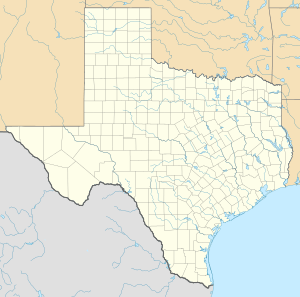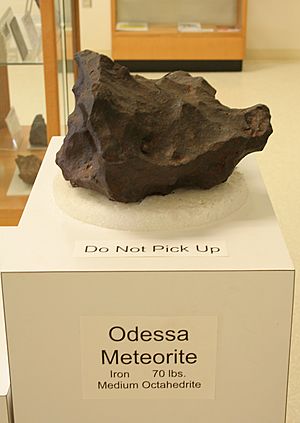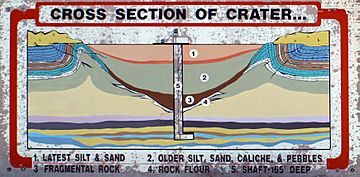Odessa Meteor Crater facts for kids

Meteor crater and museum
|
|
| Impact crater/structure | |
|---|---|
| Confidence | Confirmed |
| Diameter | 550 ft (168 m) |
| Depth | 100 ft (30 m) |
| Age | 63,500 years |
| Exposed | Yes |
| Drilled | Yes |
| Bolide type | Octahedrite (IAB) |
| Location | |
| Location | Ector County, West Texas |
| Coordinates | 31°45′22″N 102°28′44″W / 31.7560°N 102.4788°W |
| Country | United States |
The Odessa Meteor Crater is a big hole in the ground in West Texas, United States. It was made when a meteorite crashed into Earth a long, long time ago. You can find it southwest of the city of Odessa.
It's easy to visit, about 3 miles south of Interstate 20. This crater is one of three places in Texas where meteorites have hit. The other two are the Sierra Madera crater and the Marquez crater.
Experts say the Odessa crater is the biggest of several smaller craters nearby. These craters were made when thousands of iron meteorites, called octahedrites, crashed here long ago.
Scientists have found five craters at the Odessa site. They also have maps showing where meteorite pieces were found. Most pieces were found north and northwest of the main crater.
The main crater was one of the first to be studied. Now, its structure helps scientists name similar impact sites worldwide. Over 1,500 meteorites have been found in the area. The biggest one weighed about 300 pounds!
Even with all these finds, there is no giant meteorite buried under the main crater. The site is a National Natural Landmark. This means it's a special place protected by the National Park Service. There's a small information area and a nature trail for visitors.
What is the Odessa Meteor Crater?
The Odessa Meteor Crater is a large bowl-shaped hole in the ground. It was formed when a space rock, called a meteorite, hit Earth. This happened about 63,500 years ago. That was during the Pleistocene Ice Age!
The crater is about 550 feet wide. When it first formed, it was around 100 feet deep. Over thousands of years, soil and dirt filled it in. Today, the deepest part is about 15 feet. You can still see it clearly from the surrounding flat land. It's not as dramatic as the famous Meteor Crater in Arizona, but it's still very cool!
Meteorite Discoveries and Museum
Many pieces of the meteorite have been found around the crater. These pieces are made of iron and are called octahedrites. The largest piece ever found weighed about 300 pounds! Imagine holding a rock that heavy.
There is a small museum at the site. It shows off some of the meteorites found there. You can learn all about how the crater formed. It's a great place to see real pieces of space rock up close.
In 2013, the crater and its museum curator, Tom Rodman, were featured on the TV show Texas Country Reporter. This show tells stories about interesting places and people in Texas.
See also
- Impact crater
- List of impact craters in North America
- Marquez crater
- Meteor Crater
- Monahans Sandhills State Park
- Sierra Madera crater
 | Percy Lavon Julian |
 | Katherine Johnson |
 | George Washington Carver |
 | Annie Easley |




